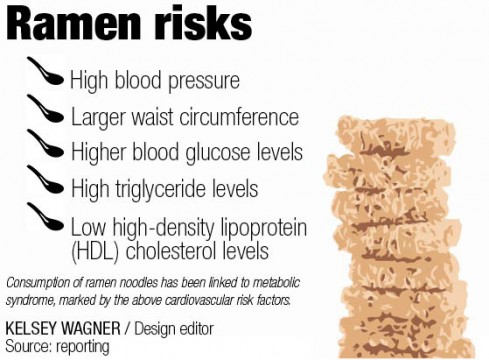Ramen noodles can be a lifesaver for college students on a budget, however, a recent study published in the Journal of Nutrition, found that ramen noodles might be more trouble than they are worth.
The study linked the consumption of instant noodles — often referred to as ramen — to heart disease and other health issues, particularly in woman.
The researchers analyzed a group of 10,711 South Korean adults, ages 19-64. Of the sample group, 54.5 percent were women.
In its conclusion, the study found that women who consumed ramen at least twice a week were 68 percent more likely to have metabolic syndrome than women who had a healthier diet.
Metabolic syndrome is “a cluster of cardiovascular risk factors,” said Dr. Martha Gulati, section director of Preventative Cardiology and Women’s Cardiovascular Health at the Ohio State Wexner Medical Center. Those risk factors include high blood pressure, larger waist circumference, higher blood glucose levels, high triglyceride levels and low high-density lipoprotein cholesterol levels.
“If you have any three of those five risk factors, you have the metabolic syndrome,” Gulati said. “Which means that there are higher risks of heart disease and diabetes in the future.”
According to the National Blood, Lung and Heart Institute, a person who has metabolic syndrome is typically “twice as likely to develop heart disease and five times as likely to develop diabetes” compared to a person who does not have metabolic syndrome.
Gulati advised against a diet heavy on noodles, despite how cost-efficient and easy they might be. “They’re cheap, and they’re easy,” Gulati said. “But you can’t look at that food and think that it’s nutritionally complete or that it’s healthy for anyone to consume, particularly on a daily basis.”
It is a processed food, high in saturated fat and high in salt, which in turn leads to heart disease, Gulati said.
A standard package of Top Ramen brand oriental flavor ramen noodles contains 380 calories, according to the nutrition facts on the brand’s website. Of those calories, 120 come from fat. The package of ramen also accounts for about 66 percent of the daily recommended amount of sodium intake.
“It would be better to eat food that isn’t processed, no matter what you’re choosing,” Gulati said.
She said ramen should be eaten once a week at most — and that even if a student does eat it, they should eat it in smaller portions and balance out their meals with other nutritional options.
Gulati also advised exercise as a countermeasure against potential risk factors.
“Even if you have those (metabolic syndrome) risk factors, if you’re more likely to exercise, you’re probably less likely to get heart disease,” Gulati said.
It’s common to find ramen noodles in campus grocery stores. The C-Stores sell about 80-85 packages of instant noodles every day, said Student Life spokesman Dave Isaacs in an email.
One OSU student, Mahmud Bari, a first-year in exploration, seems to love ramen noodles.
“Ramen noodles are God’s gift to the modern college student,” Bari said.
He said they are cheap, easy and convenient, and that is why he eats them four to five times a week at his off-campus home.
“I buy them for, like, 16 cents from Walmart,” Bari said, explaining that he buys the variety pack in order to “mix things up.”
Bari had not heard about the study on ramen noodles before, but was not surprised by its conclusions.
“I mean, we live in a messed up world,” Bari said. “Everything good is bad for you.”
Bari said he does not plan on changing his noodle-eating habit.



![A study from whiskey brand Flask & Barrel has identified Ohio’s favorite drinking songs and artists. Credit: Allie Healy Howard via TNS [Original caption: A flight of beer at Woodland Farm Brewery in Marcy.]](https://www.thelantern.com/files/2024/08/20240805-AMX-US-NEWS-CNY-BREWERY-OPEN-NEW-TAPROOM-1-SMG-384x253.jpg)